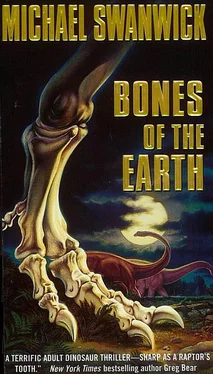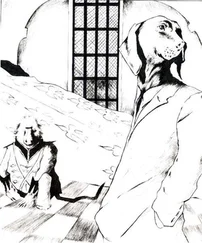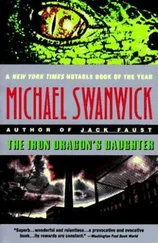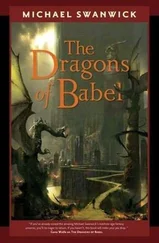“Body temperature can be either constant or variant, regulated internally or externally, and in service to a high resting metabolism or a low one. Maintaining a constant body temperature is called homeothermy. Variant temperature, usually close to the variation in ambient temperature, is poikilothermy. Internally regulated temperature is called endothermy. Externally regulated temperature is called ectothermy. An animal whose resting metabolism remains at a high level is tachymetabolic. One whose resting metabolism slows to a low level of activity is brady metabolic.
“Got that? Good.
“Now, a ‘warm-blooded’ animal is generally homeothermic, endothermic, and tachymetabolic, where a ‘cold-blooded’ one is poikilothermic, ectothermic, and barymetabolic. The naked mole bird, however, is homeothermic, ectothermic, and tachymetabolic. Is it cold-blooded? There are insects whose body temperatures, at rest, reflect the ambient temperature, but whose wing muscles raise their temperatures much higher than that during flight. They’re poikilothermic, endothermic, and brady metabolic. Warm-blooded or coldblooded? How about hibernating mammals? Homeothermic, ectothermic, brady metabolic. Do they shift between bloodednesses?
“Moreover, when you begin to look into the mechanisms of all these things, you’ll realize that I’ve been oversimplifying furiously. It’s all a lot more complicated than I’ve made it sound.
“So I’ve decided to take a whack at straightening the whole mess out.”
All the while she talked, Jimmy noted, Salley stood to the far side of the room, sad-eyed and silent. She had only spoken the once, and then without addressing anybody directly. Nor had she looked at Griffin, save casually and fleetingly.
Well, that was easy enough to decipher. It was a terrible blessing she’d been given, to see herself the way everybody else did. He imagined it was humbling. What Jimmy couldn’t figure out was why Gertrude was being so talkative.
Griffin listened silently, head down, flipping through book after book. “Leather bound,” he said, when Gertrude wound down at last. “Steel engravings. You’re certainly being treated well. And this place of yours. Do all the inhabitants of this era live in towers like this?”
“Some do. Most don’t.”
“Then you’re being indulged,” Molly Gerhard said. “Why? By whom?”
“Our sponsors. I cut them a deal.”
“What for what?” Molly asked crisply.
“You already know what I got: permission to change my personal past. Otherwise you wouldn’t be talking with me now. My life here is not what I bought, but rather the price I paid. I serve easy masters. They allow me to engage in activities I find rewarding—research, mostly—and in return I remain available for examination, should any questions about human beings arise.”
“Yes, but what do you do?” Molly Gerhard insisted.
“I’m the type specimen for Homo sapiens.‘’‘’
Jimmy made a face, and Griffin explained: “When Linnaeus first set up his system of binomial nomenclature, he defined species with an abstract type—a written description of their features. So he felt free to replace his specimens with superior examples. But, as always, mistakes were made. Which occasionally led to the absurdity of a species being represented by a sample from another species entirely.
“So nowadays, when a species is described, it’s done from an individual organism, called the type specimen, which is carefully collected and preserved, and then referred to whenever there’s any question as to the taxon’s attributes.”
“I’m not sure I…”
“You can think of Dr. Salley as being the physical definition of humanity. She is the yardstick by which all human beings are measured.”
“Wait.” Jimmy spoke at last, and as he did so felt that fine top-of-the-world mood collapse to nothing within him. Back to the workaday world again. “You mean to say that my humanity is judged by how closely I resemble her?”
“And what’s wrong with that?” Gertrude asked.
It was a question that required a day’s response or none at all. “Maybe it’s time you told us why we’re here,” Griffin suggested.
“First a drink,” Gertrude said. “Then I’ll tell you everything.”
She poured them glasses of a clear and refreshing fluid. A moment before, Jimmy had been thinking that Griffin and Molly Gerhard looked tired and ready for sleep. But after that drink, they brightened right up. He himself felt ready to climb mountains. He couldn’t help thinking that a case of the stuff would make a fine souvenir to bring home.
“I was on the original Baseline expedition,” Gertrude said. “Terrible though it is to say, even with the deaths, I was happy. I had dinosaurs. I had Leyster. I had everything. If I hadn’t alienated Leyster, I could have stayed in the Maastrichtian forever.”
“How did you alienate him?” Molly Gerhard asked.
“I was a fool.”
* * *
When the bomb went off, Gertrude was engaged in folding up the rocket launcher. Birds were chirping in the trees, and she was marveling at how familiar-yet-strange their song sounded. Like birds everywhere, and yet oddly scored. None of the cries of this age were known to her yet. But they were obviously as sophisticated as those of modern birds, sixty-five million years hence. Music, it seemed, was basic. It arose first among the small, feathered but flightless dinosaurs. The oviraptor had a pretty song.
Then came the explosion.
She ran through the smoke and confusion, and found three bodies lying on the ground: Chuck, Daljit, and Tamara. Two of them were already dead. The third, Daljit, had lost most of an arm.
Leyster was already kneeling at her side, making a tourniquet.
Gertrude ran to get the med kit. She flipped an ampule of morphine into a syringe, found a vein, and shot the painkiller into Daljit’s good arm.
The others were milling about uncertainly, hovering over the bodies, asking each other what they should do. Gertrude looked up, and snapped, “Don’t just stand there! Pitch a tent. Make up a bed for Daljit. Clear away these bodies. Somebody check and see how much of our supplies have been destroyed. Jesus fucking Christ! Do I have to do everything myself?”
The students scattered in purposeful action. Helping Leyster try to staunch the flow of blood, Gertrude felt a small twinge of satisfaction. Work was the best thing for them, she knew.
Work would keep them all alive.
* * *
Daljit’s injuries were too extensive to be successfully treated in the field. She died that night.
They buried her body next to the others with a minimum of ceremony. The graves were positioned away from the camp, to avoid drawing in predators, as well as for reasons of morale.
Then, to keep the crew from dwelling on their loss, Gertrude set them to building log cabins for everyone. There was some grumbling because hers and Leyster’s was bigger than the others. But they were a couple by then—they slept together for the first time the night of the disaster—and naturally they needed the room.
It was not difficult keeping everybody busy. There was more than enough work that needed doing, if they were to survive. The trick was to provide everybody with a sense of purpose. With so much equipment destroyed by the bomb, they couldn’t hope to perform a fraction of the research they’d originally intended. Still, they could do some. At her instigation, Leyster built a blind on Barren Ridge where they could observe the tyrannosaur nest.
She and Leyster, being the best qualified, traded off on the tranny watch. Sometimes, as a reward for good work, she let one of the others assist.
Jamal came to Gertrude one day when she was in the blind. She was watching Boris and Bela, the runts of the clutch, mock-battling one another, snapping at each other’s snouts until one of them got a purchase and they rolled over and over, kicking with their feet like kittens. “Fishing good?” she asked, without putting down the binoculars.
Читать дальше






